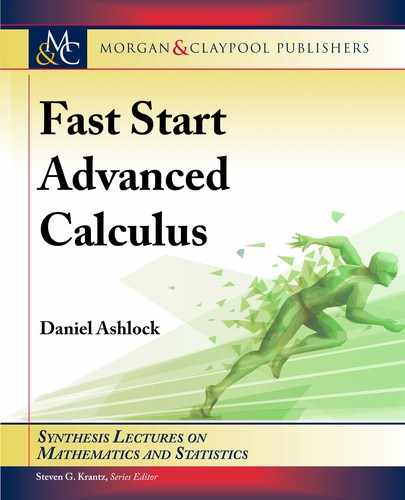
Series Editor: Steven G. Krantz, Washington University in St. Louis
Fast Start Advanced Calculus
Daniel Ashlock, University of Guelph
e three books in the fast start calculus series were developed over a period of ve years with classroom
testing each year at the University of Guelph. e development team included two physics professors and
two senior teaching assistants in math in addition to the author. e books cover dierential and integral
calculus with a selection of topics from advanced calculus including partial derivatives, multiple integrals,
and sequences and series up to Taylor series. e topics track the use of calculus in rst year physics and can
be paired with a physics course that provides an anchor for the mathematical concepts. Over the rst ve
years of use, including three revisions to improve clarity and accuracy, no more than 3% of a class dropped
or unked the joint math and physics course. is contrasts with a 12%-20% rate in the standard calculus
course. e topics in the course are ordered in a novel fashion, moving dicult theoretical material to the
later part of the rst semester, and moving quickly to calculus topics with applications in the physical sciences.
e third in the fast start calculus series, this book focuses on a selection of topics used in the second
semester of rst year physics, presenting them as traditional calculus topics. We begin with partial derivatives
and their application to gradients, directional derivatives, and tangent planes. e second chapter covers
multivariate optimization as an application of partial derivatives through LaGrange multipliers. e third
chapter covers advanced applications of integration including volume of rotation, arc-length, and surface area
of rotation, and then introduces multiple integrals and the application of center of mass.e book concludes
with a treatment of sequences and series including convergence tests, power series and work-saving tricks to
nd power series via calculus, and Taylor’s series and Taylor’s theorem for approximation. ese topics form
an excellent grounding for further study of advanced calculus. e topics in this text are typically included in
the third semester of calculus, but were presented in the second semester of the course under which the texts
were developed, to meet the needs of physical science courses.
store.morganclaypool.com
About SYNTHESIS
This volume is a printed version of a work that appears in the Synthesis
Digital Library of Engineering and Computer Science. Synthesis
books provide concise, original presentations of important research and
development topics, published quickly, in digital and print formats.
ASHLOCK FAST START ADVANCED CALCULUS MORGAN & CLAYPOOL
Series ISSN: 1938-1743
Fast Start Advanced Calculus

Synthesis Lectures on
Mathematics and Statistics
Editor
Steven G. Kranz, Washington University, St. Louis
Fast Start Advanced Calculus
Daniel Ashlock
2019
Fast Start Integral Calculus
Daniel Ashlock
2019
Fast Start Differential Calculus
Daniel Ashlock
2019
Introduction to Statistics Using R
Mustapha Akinkunmi
2019
Inverse Obstacle Scattering with Non-Over-Determined Scattering Data
Alexander G. Ramm
2019
Analytical Techniques for Solving Nonlinear Partial Differential Equations
Daniel J. Arrigo
2019
Aspects of Differential Geometry IV
Esteban Calviño-Louzao, Eduardo García-Río, Peter Gilkey, JeongHyeong Park, and Ramón
Vázquez-Lorenzo
2019
Symmetry Problems. ne Navier–Stokes Problem.
Alexander G. Ramm
2019
..................Content has been hidden....................
You can't read the all page of ebook, please click here login for view all page.
